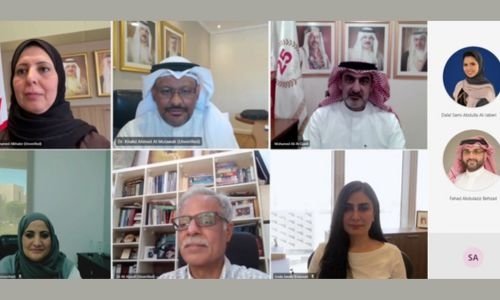The ICT Governance Committee recently held its seventy-second meeting, chaired by Mohammed Ali Al Qaed, Chief Executive of the Information & eGovernment Authority. The meeting, conducted via video conferencing, focused on various projects and procurement requests from government entities. The agenda for the meeting included discussions on significant topics such as the National Genome Project by the Ministry of Health, aimed at establishing Bahrain’s national genetic map. This initiative reflects global advancements in genetic testing technologies and aims to create population genetic maps through national genomics initiatives. Bahrain has made significant progress with the National Genome Program, implementing modern healthcare policies and advancements in research, innovation, and population bioinformatics. The project will establish a genetic data platform using cloud computing for the necessary technical infrastructure.
Furthermore, the committee reviewed the second phase of the National Real Estate DataBank (Aqari) Project, which supports the real estate sector by providing accurate and up-to-date information for better market insights. The upcoming phase of the project will focus on improving the user interface and experience, developing data verification and quality mechanisms, and enhancing reports and data dashboards. The integration of artificial intelligence technologies into interactive maps and predictive data dashboards will aim to create a favourable investment environment, encouraging real estate investment and boosting investor confidence. This development will play a crucial role in enhancing the real estate sector in Bahrain.
In addition to these projects, the meeting also discussed the Government Innovation Centre and Laboratory Project by the Information & eGovernment Authority. The centre, to be established at the authority’s headquarters, will serve as a central hub to guide government entities in leveraging technology to address challenges and explore opportunities. The focus will be on improving the efficiency and quality of government services, cost optimization, and adapting to rapid technological changes such as artificial intelligence, augmented reality (AR), and blockchain. This initiative will play a pivotal role in driving innovation and advancements within the government sector, ultimately benefitting the citizens of Bahrain.
Moreover, the committee addressed various ongoing projects and procurement requests aimed at developing and supporting government systems and improving the quality and efficiency of IT services. The meeting also focused on the implementation of decisions approved in previous meetings, monitoring the progress of these tasks. The attendees at the meeting included key figures such as Nawal Ibrahim Al Khater, Undersecretary for Policies, Strategies, and Performance at the Ministry of Education, and Dr Hessa Jassim Al-Junaid, Dean of the College of IT at the University of Bahrain, among others. The support team of the ICT Governance Committee also participated in the meeting, contributing their expertise to the discussions and decisions made during the session.
In conclusion, the latest meeting of the ICT Governance Committee highlighted the significant initiatives and projects being undertaken to drive technological advancements in Bahrain. The National Genome Project, the second phase of the National Real Estate DataBank Project, and the Government Innovation Centre and Laboratory Project are all aimed at leveraging technology to improve government services, enhance market insights, and drive innovation within the public sector. The integration of artificial intelligence, augmented reality, and blockchain technologies will play a crucial role in shaping the future of government services in Bahrain, ultimately benefiting both the government and the citizens. By working together and harnessing the power of technology, Bahrain is poised to achieve significant progress and advancements in the realm of information and communication technology.











